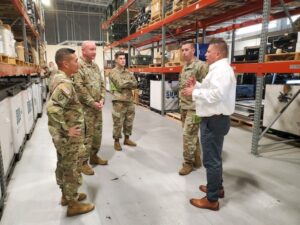
Story by C.J. Lovelace
U.S. Army Medical Logistics Command
FORT DETRICK, Md. — The U.S. Army Medical Materiel Agency takes great pride in the safety of its workforce, and the organization is taking steps to further solidify that commitment through official certification programs.
In late September, USAMMA completed Stage 1 action items under the Army Safety and Occupational Health Management System, or ASOHMS, as well as a Stage 2 baseline assessment as the agency moves through the three-stage process.
“When implementing ASOHMS, having a workplace culture where leadership values safety, empowers employees and fosters continuous improvement is absolutely essential,” said Denny Ritko, of the DOD’s Safety Management Center of Excellence. “We experienced this culture during our visit with USAMMA and I feel this workplace environment will serve as a great foundation for ASOHMS success.”
ASOHMS provides a framework for Army organizations to systematically manage their safety and occupational health programs, protecting Soldiers, civilians and property from workplace risks and hazards, and ultimately supporting the organization’s goal of mission readiness.
The program consists of six capability objectives, each broken down into various sub-elements. They include:
• Leadership engagement and personnel/Soldier participation
• Investigate and report mishaps, incidents and illnesses
• Safety and occupation health training and promotion
• Inspections and assessments
• Hazard analysis and development of countermeasures
• Health protection and readiness
As USAMMA moves into the second stage, they have 41 in-progress action items to tackle before entering the final stage, which is expected to begin in the fourth quarter of the 2025 fiscal year.
USAMMA Commander Col. Joselito “Joe” Lim said the team’s work to implement ASOHMS reinforces its commitment to safety across the organization and to partner agencies and units around the globe.
“As an organization with a global mission, we are working to synchronize our safety efforts with those of our host sites, agencies and units,” Lim said. “We strive for excellence in everything we do, and that starts with the high safety standards that support our workforce, the service members who rely on us and our customer base worldwide.”
USAMMA is one of three direct reporting units under AMLC, along with the U.S. Army Medical Materiel Center-Europe and U.S. Army Medical Materiel Center-Korea.
USAMMC-E in July earned recognition as an “Army SOH Star” site by fully implementing programs and safeguards in accordance with ASOHMS, while USAMMC-K continues to maintain its certification and has earned several safety recognitions in recent years, including winning the Army’s Exceptional Organization Safety Award for the battalion level for 2022.
As USAMMA works toward its ASOHMS certification, DOD assessors conducted the Stage 2 baseline assessment on Sept. 19, consisting of interviews with 30 members of the workforce throughout the agency’s footprint. The process involved both supervisory and non-supervisory employees, including military, civilians and contractors, based at headquarters, all three Medical Maintenance Operations Divisions, the Medical Materiel Readiness Program and one Army Prepositioned Stocks site.
Most of USAMMA’s worksites are comprised of a blended workforce with civilians and contractors working alongside service members. One specific positive, noted by the evaluation team, was that contractors expressed a strong sense of inclusion, feeling valued and part of the overall team.
A strong culture of safety starts with leadership. Lim and USAMMA Sgt. Maj. Todd Brenecki have been champions of safety and occupational health programs in the workplace, supporting both the workforce and the organization’s global mission sets.
“Workplace safety goes beyond just protecting the health and wellbeing of our Soldiers and civilian employees,” Brenecki said. “A strong safety culture enables efficiency in the work environment, while reducing potential mishaps and boosting morale throughout the team.
“In the end, safety is everyone’s responsibility,” he said. “And it ensures we stay globally responsive, ready and resilient in our mission to support the warfighter.”